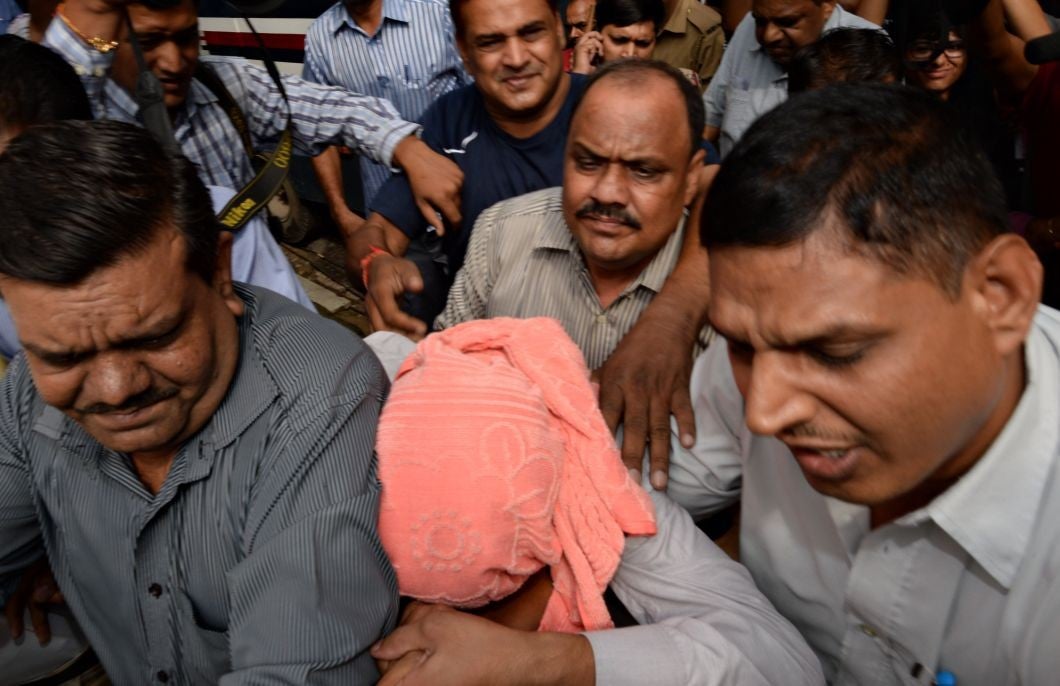Family of Delhi gang rape victim demand death penalty as guilty teenager is sentenced to three years in juvenile institution
Ruling is first for five males standing trial for the assault of the 23-year-old student

Your support helps us to tell the story
From reproductive rights to climate change to Big Tech, The Independent is on the ground when the story is developing. Whether it's investigating the financials of Elon Musk's pro-Trump PAC or producing our latest documentary, 'The A Word', which shines a light on the American women fighting for reproductive rights, we know how important it is to parse out the facts from the messaging.
At such a critical moment in US history, we need reporters on the ground. Your donation allows us to keep sending journalists to speak to both sides of the story.
The Independent is trusted by Americans across the entire political spectrum. And unlike many other quality news outlets, we choose not to lock Americans out of our reporting and analysis with paywalls. We believe quality journalism should be available to everyone, paid for by those who can afford it.
Your support makes all the difference.India is in the grip of a debate over what should happen to a teenager convicted over his role in the rape and murder of a Delhi student and who was subsequently sentenced to three years in a juvenile institution.
In the first ruling relating to five males standing trial for the assault last year on the 23-year-old physiotherapy student, a juvenile court in Delhi found the 18-year-old guilty, having delayed announcing its decision several times.
Anil Sharma, the chief investigating officer in the case, told the media that the juvenile had been “held guilty for rape and murder and sentenced to three years, subject to review”.
Many in India believe the sentence handed down is too lenient and that he should face the death penalty, given the brutality of the assault. Led by the family of the young woman, they have called for Indian law to be changed so that he can be treated as an adult and face the death penalty.
On Saturday, the family of the young woman, who cannot named for legal reasons, were present to hear the announcement. Even though the sentence was the maximum available under Indian law, the young woman’s family emerged to tearfully demand a tougher sentence.
“We are not accepting this. This is not true justice,” said Gaurav Singh, the brother of the young woman. “We want hanging.”
According to the Associated Press, the mother of the student, Asha Devi, said: “He should be hanged irrespective of whether he is a juvenile or not. He should be punished for what he did to my daughter.”
The attack last December on the 23-year-old medical student sparked outrage across the world and an unprecedented debate within India about the position of women. The government hastily enacted new laws that increased the punishments for sex offenders.
In the aftermath of the attack, Delhi police arrested six males, including one man who was found hanging in his prison cell earlier this year. In addition to the teenager who was convicted on Saturday today, four men are still being tried for gang-rape and murder. Like the juvenile, the four men have denied the charges.
The inquiry by the Delhi juvenile justice board was completed three weeks ago but an announcement was deferred because of legal efforts being made by a senior opposition politician to have the teenager tried as an adult.
As the two parallel hearing were going ahead, the family of the physiotherapy student said the teenager should not be treated any differently to the adults if he was convicted. Two weeks ago, the family told the Independent on Sunday that only by securing the death penalty would they feel they had received justice.
The role of the juvenile and the punishment he should receive has been among the most controversial aspects of the gang-rape case. The public mood was fuelled by anonymous leaks from the police to the Indian media that claimed the teenager was one of the most brutal of the attackers and had led the assault.
Whether or not this is true remains unclear. Evidence collated by the police and handed to prosecutor made no mention of this and the trial of the juvenile has been held behind closed doors.
Yet child rights activists say the Indian authorities must ensure the 18-year-old, who is the eldest of five children and is from an impoverished labouring family in rural Uttar Pradesh, has a chance at rehabilitation.
“No doubt, this was a horrendous attack. But we are being driven by the desire for retribution when we should be looking to rehabilitate,” said Meenakshi Ganguly of Human Rights Watch.
Shireen Vakil Miller, of Save the Children India, said most youngsters who came into conflict with the law were from a background of “neglect, abuse and deprivation”.
“The most important step is to ensure that there is a comprehensive rehabilitation package for the juvenile which includes counselling, and a provision for vocational training,” she added. “This would help the juvenile reintegrate into society.”
The 23-year-old physiotherapy student died of internal injuries two weeks after being raped and assaulted with an iron bar on a bus as she and a male friend tried to find their way home after a visit to a cinema in the south of Delhi. Her friend was also beaten up before both were stripped naked and thrown from the vehicle.
While the media has been reporting more cases of sexual assault, activists say the authorities have done very little to protect women. They say they there are countless thousands of rapes and assaults across India that get little attention.
Join our commenting forum
Join thought-provoking conversations, follow other Independent readers and see their replies
Comments